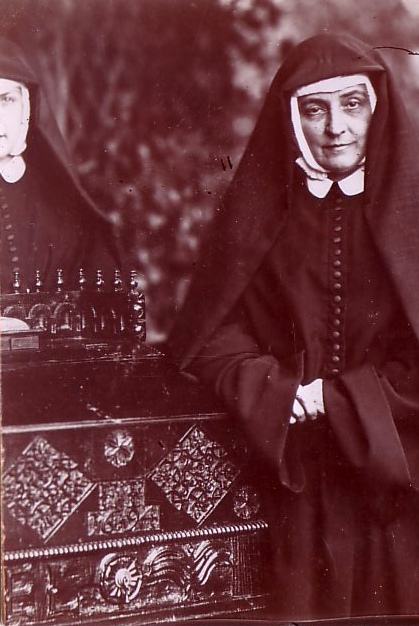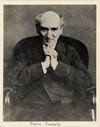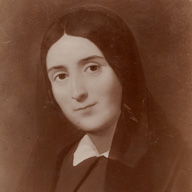- Connelly v. Connelly - a minor divorce case.
- Connelly v. Connelly - a divorce case in 1849-57 Victorian England.
- Connelly v. Connelly - the most scandalous case you never heard of.
- Connelly v. Connelly - in which a Roman Catholic Priest sued a Roman Catholic nun for restitution of conjugal rights in London. (Both of them were American.)
Off they went. Pierce - who had a taste for the flamboyant - waited, and was received into the Roman Catholic Church on Palm Sunday, 1836, in Rome, at a very fashionable church. (Cornelia had been received before they left, in a small private ceremony in Natchez.) The couple quickly became hugely popular in Rome. Pierce got an audience with Pope Gregory VI, supposedly moving the pope to tears with his fervent religious passion. Pierce also became friends with the ancient, influential, and wealthy Borghese family. And he moved his whole family into a palazzo owned by the Earl of Shrewsbury, who became his patron.
All was well, except that Rome was almost 100% Catholic, and probably 90% clerical, and all the power lay in the hierarchy of the church. Pierce - who had a wee bit of ambition - is mulling over becoming a Roman Catholic priest. There was a problem: He was married, and his wife was pregnant. There followed a hiatus in which Cornelia gave birth to their 3rd son (John Henry) in Vienna, they move back to Natchez thanks to a bank crisis (they're not modern phenomenon, folks - Pierce's family got wiped out in the crash), and Pierce became a teacher.
Tragedy struck: they lost a newborn daughter, and then 2 year old John Henry died after falling into a vat of boiling sugar. Eight months later, Pierce announced he was definitely called to be a Roman Catholic priest. Cornelia urged him to think it over (she was pregnant again, so she might have had some doubts about his being called to celibacy), but he was adamant. So, after their fifth child, Francis, was born, Pierce sold the house, and moved to England with Mercer, leaving Cornelia, Adeline, and Francis in a convent at Grand Coteau.
| Palazzo Borghese, Roma |
But what next? Well, Pierce became chaplain for Lord Shrewsbury in England and took Mercer with him. As for Frank, well, Pierce wrote a letter in which he said, "You know the Prince Borghese has taken charge of Frank's education, and he will be put either here in the College of Nobles in Rome, or with Merty at Stonyhurst in England... So far, you see, things have been ordered very wonderfully."
Meanwhile, the English Bishop Nicholas Wiseman called Cornelia to come to England to educate Catholic girls and the poor, forming the Society of the Holy Child Jesus. (This religious foundation still exists and operates, teaching children.) So off to England she went. Soon she was settled in, teaching 200 children, and doing pretty well.
 |
| Cornelia Connelly, about the time of the lawsuit |
So he filed the lawsuit "Connelly v. Connelly", asking a Protestant court "that Cornelia be compelled by law to return and render him conjugal rights." (He omitted mentioning to the court that he was a Roman Catholic priest. That came up later.) The scandal was huge. Anti-Catholic sentiment was rife Victorian England. The general opinion was that here was a man robbed of his wife by the Papists, who'd shut her up in a convent and wouldn't let him even see her! And the only reason they (the Papists) hadn't taken the children was because Pierce was smart enough to take them away himself. Cornelia and Bishop Wiseman were denounced from Protestant pulpits, burned in effigies on Guy Fawkes Day, newspapers were full of the usual tabloid trash. After a year, the judge ruled that her Roman law wasn't binding in England, and gave Cornelia the option of forcible return to Pierce as his wife, or prison. An appeal was launched to the Privy Council. Now, as we have seen, Pierce had already won the in the court of public opinion, and the Privy Council was just as Protestant as the regular court - But in the end, Cornelia won.
At least, she won her liberty - she could never win her children back (again, they were legally considered Pierce's property). In fact, she lost two of them forever. Pierce sent Mercer back to Natchez, where he died at 20 in 1853 of yellow fever. Pierce took Adeline and Frank abroad, where he renounced Catholicism and earned a living from writing venomously anti-Catholic tracts. Years later, Adeline was spotted taking care of an aging Episcopal priest at the American Parish of St James Church in Florence, Italy. That was Pierce, had who re-embraced the Episcopal church and served there, unknown and unimportant, from about 1870 until his death in 1883. He is buried in Cimitero Evangelico degli Allori. Francis settled in Rome, where he became a painter. He loved his mother, but hated the Roman Catholic Church for destroying his family. He never married, but had a daughter, Marina, who ended up marrying into the Borghese family (Pierce would have been so proud).
 |
| Pierce Connelly in old age |

Cornelia Connelly remained for the rest of her life in England, expanding her foundation, and dying in 1879 at the convent she founded in St. Leonards-On-The-Sea, Sussex.
But the memory of Connelly v. Connelly lingers as one of the strangest lawsuits ever to come up in British history.


Whew! That is a strange case. While on jury duty, I met an Episcopal monk, hooded robe and everything. I never knew they existed.
ReplyDeleteWhat a story! And food for any number of novels.
ReplyDeleteI bet you could do a wonderful book on odd legal cases.
There are some amazing legal cases tucked away in the history books - and this one has always fascinated me. Pierce was a real piece of work - a religious conman if there ever was one. Cornelia was lucky to get shed of him.
ReplyDeleteWhat's most interesting to me is the way that playing to public sentiment, hystrionics included, was as significant then as it is now. I know that rumor has always played a big part in social situations and politics, but I am still bowled over by the way Pierce was able to play everyone for fools, to the terrible detriment of his wife and children. I guess human nature doesn't change very much.
ReplyDeleteLike Janice, I think this story would fit well into a book on odd legal cases. Or maybe it could provide the premise for a historical novel. You'd just have to add a murder. I vote for Pierce as the victim.
ReplyDeleteAmazing, Eve! I love learning things like this.
ReplyDeleteMan, I am glad to have been born in this time! Thanks again for reminding me, Eve. Fascinating post.
ReplyDeleteFascinating story, Eve! Pierce was one conflicted SOB. In the end Cornelia achieved usefulness and dignity, while her despicable husband became bitter and despised. There's a certain justice there. I disagree with Francis, though--it wasn't the Church that destroyed his family, it was his father.
ReplyDeleteYes, it was all Pierce's doing - and, to some extent, Cornelia, who I still think could have pointed out, "Well, you might want to be a priest, Pierce, but we had sex two months ago - I don't think that's going to fly." And stuck to it.
ReplyDeleteC'mon. In a group of mystery aficionados, no one else has commented on this line?
ReplyDelete"2 year old John Henry died after falling into a vat of boiling sugar."
Quoi?!